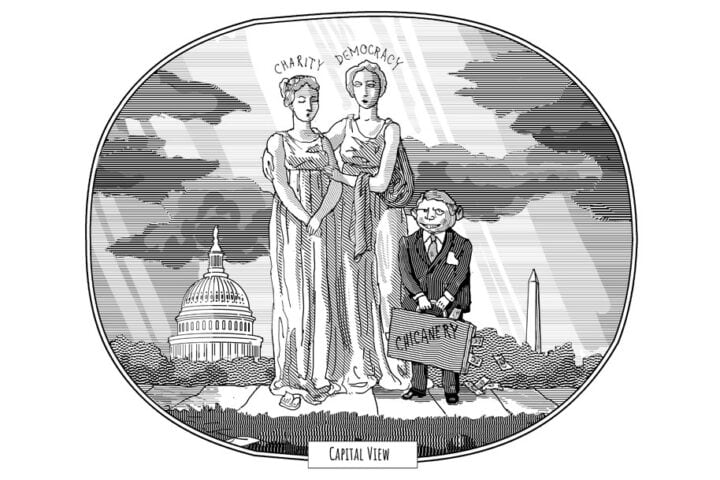Fighting Discrimination
I thank Helen Andrews for her rich review of books by Jeremy Carl and myself on the culture war (“Beyond the Pale,” Summer 2024). While she makes many good points, her framing of me as a liberal as against Carl the conservative is not accurate. In fact, as Carl’s numerous references in his book to my work suggests, we are both national conservatives who endorse the classical liberal procedures of the Constitution while eschewing left-liberalism in the culture.
Though Andrews suggests that the rising share of women in the professions accounts for the woke revolution, this trend cannot explain why young women didn’t differ from young men in their politics until the early 2000s, and why the youth gender gap has only opened up in recent years. And while I believe rising ethnic diversity is not positive for the country, it must be said that on many measures of woke attitudes, women and LGBT respondents are far more extreme than men or heterosexuals and that the difference between Hispanics/Asians and whites is small. For example, in a large University of Wisconsin survey, the proportion of female students who agree that undergraduates should report an instructor who says something that “some students feel causes harm” is 53%, compared to 27% for men. This 26-point gap compares with a 24-point difference between straight and LGBT students but just an 8-point gap between white and nonwhite students. I find a similar result in my youth survey on questions such as whether “America is built on stolen land” or is racist.
I contend that if institutions want to use affirmative action to increase the presence of minorities or women, they should be forced to match this move with equivalent action to boost the number of Republicans. I also want to expand civil rights law to protect conservatives from being discriminated against. Andrews believes that this will lead to the rules being used only to protect the Left against conservative-dominated institutions (are there any?). But if she is this pessimistic about implementation, why should we have any confidence in her idea of using the law to prevent discrimination against white people? Surely, by this logic, anti-discrimination law will only be used to convict whites for discriminating against minorities.
Jeremy Carl and I agree that we need civil rights law but it should be reformed to eliminate noxious extensions such as disparate impact and affirmative action. Meanwhile, conservative politicians and lawyers should be far more vigilant in using it to protect whites and conservatives from the country’s biased institutions.
Eric Kaufmann
University of Buckingham
United Kingdom
Academic Freedom
I very much appreciate Michael Kochin’s thoughtful engagement with my book You Can’t Teach That! (“Class Wars,” Summer 2024), which, as he notes, takes for granted the Supreme Court’s existing doctrinal commitments regarding freedom of speech under the First Amendment—commitments that date from the mid-20th century. Perhaps they should be reconsidered or placed on a different footing, but that is not the task of this particular book. My question is simply this: given those commitments, what are the implications for laws like Florida’s Stop WOKE Act as they apply to teaching in public universities? As I hope the book shows, although that question doesn’t have an obvious or easy answer, I think on the whole existing doctrine poses some real problems for some current state initiatives. I hope that thinking through those doctrinal questions will also illuminate some of the issues at stake in debates over academic freedom at American universities.
Kochin is more skeptical than I am about the value of some of those academic freedom principles. I certainly appreciate the concerns that his review reflects about the current state of academia and the possibility of self-correction. I think it is evident that higher education has some serious problems, and among those problems is the spread of a number of misbegotten ideas through some corners of academia. Reasonable minds can differ on how big the problem is and how best to try to address it, but, as he notes, I’m doubtful that legislative interventions in the substance of the universities’ intellectual work will be helpful in the long run.
He is disappointed that the book does not work from first principles and construct an originalist argument about the place of universities in the constitutional order. I am sure that would be an interesting project to attempt. Maybe it will be a needed argument in coming years, but I don’t think it is the argument most needed at the present moment. I have my own originalist commitments, but this particular book does not work from that perspective.
I would, however, take some issue with one point in the review. Kochin writes, “The Florida legislature did not bar these views from being heard in the classroom, only from being imposed,” and he claims that my concern is primarily whether legislatures can say that “no indoctrination take place in public university classrooms.” I think this mischaracterizes both the text of the Stop WOKE Act and how it has been defended in court. If Florida had stopped with saying that professors cannot indoctrinate, it would have been much better off—both normatively and constitutionally. Some legislative proposals have taken that approach, but Florida went well beyond banning indoctrination. As the final chapter of my book elaborates, I think even the effort to ban “indoctrination” legislatively is complicated, but those complications are more conceptual and practical than constitutional. Neither the Court nor the American Association of University Professors has ever claimed that professors have a right to indoctrinate students, and I would not defend their right to do so. To that degree many professors on the left will be unhappy with where my argument goes, but the book tries to identify both the freedoms and the responsibilities of teaching in a university.
Keith E. Whittington
Princeton University
Princeton, NJ
Michael S. Kochin replies:
Florida’s Stop WOKE Act states that its prohibitions on racist indoctrination “may not be construed to prohibit discussion of the concepts listed therein as part of a course of training or instruction, provided such training or instruction is given in an objective manner without endorsement of the concepts.” But I think the discussion needs to move beyond the plane of courtroom wrangling. Neither the Florida legislature nor the American Association of University Professors looks favorably on woke racist indoctrination. Is there so much of it in our legally privileged institutions of higher education as to warrant external political intervention in academic affairs? What forms of intervention will help more than harm? Is such intervention permitted (or even required) under the Constitution, as amended to secure equality under the law for all Americans regardless of race? And, if not, how does the Constitution need to be further amended to ensure that legally privileged institutions of higher education further the racially egalitarian ends that, as Americans, we should all share? Perhaps the greatest contribution of Whittington’s book will be if it provokes everybody concerned with the future of America and her universities to address those questions thoroughly and forthrightly.



